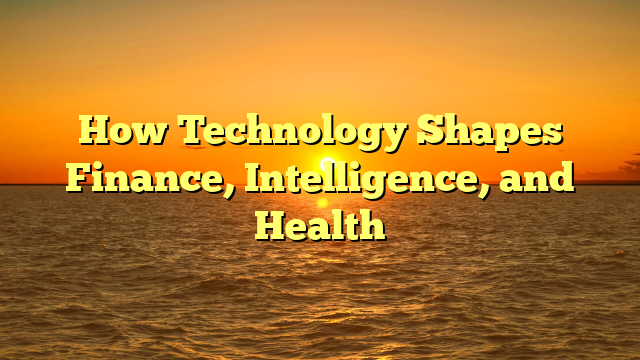The rapid growth of technological innovation is influencing every aspect of our daily lives. Whether it’s through financial technology, the rise of artificial intelligence (AI), or breakthroughs in medical technology, we are witnessing a transformation that is changing how finance works, how we perceive intelligence, and improve healthcare systems. This article explores how these advancements are reshaping our world in exciting and complex ways.
How Technology is Reshaping the Financial Landscape
The finance industry has undergone a radical transformation thanks to the advent of technology. In recent years, financial technology has changed the way businesses and individuals manage their money, making financial services more accessible, efficient, and secure.
Among the many technological advancements, blockchain has become a cornerstone of modern finance. It allows for secure, decentralized transactions without the need for traditional intermediaries such as banks. Beyond cryptocurrencies, blockchain is being applied to improve contract management and reduce the risk of fraud in the financial system.
In addition, the rise of artificial intelligence (AI) in finance is paving the way for more personalized and data-driven financial solutions. Robo-advisors, powered by AI, provide tailored investment advice based on real-time data and risk profiles, making wealth management services available to a wider audience at lower costs.
The Role of AI in Shaping the Future of Intelligence
Artificial Intelligence (AI) has emerged as one of the most transformative technologies in recent years. Its ability to process large amounts of data and make decisions based on patterns has revolutionized industries such as healthcare, finance, and transportation. AI is not only changing how we use technology, but also how we understand human intelligence.
In healthcare, AI is playing a critical role in improving patient outcomes. By analyzing vast amounts of medical data, AI can assist healthcare providers in diagnosing diseases more accurately, recommending treatments, and predicting patient responses. AI’s role in personalized medicine is becoming increasingly important, as it helps tailor treatments to individual genetic profiles.
The potential for AI to mirror human intelligence is becoming more evident as researchers use machine learning to model human thought processes. By studying how the brain works, AI systems are becoming increasingly capable of handling tasks that require advanced reasoning and decision-making skills, paving the way for intelligent systems that can complement and enhance human capabilities.
How Technology is Revolutionizing Healthcare
The healthcare sector has also experienced a dramatic transformation due to technological advancements. From virtual health consultations to personalized health tracking devices, technology has made healthcare more efficient and accessible than ever before.
Telemedicine, for example, has become an essential tool, especially in rural areas or regions with limited access to healthcare facilities. Through virtual consultations, patients can receive medical advice and prescriptions without the need for an in-person visit. This not only improves access to healthcare but also reduces the strain on overburdened healthcare systems.
Wearable technology is also playing an increasingly important role in healthcare by allowing individuals to monitor their health in real-time. Devices such as fitness trackers, smartwatches, and even smart clothing provide continuous data on various health metrics, helping individuals stay informed and make better lifestyle choices. Additionally, these devices are aiding in early disease detection and prevention.
Artificial intelligence is revolutionizing the way healthcare is delivered. AI is being used to analyze vast amounts of patient data, from medical imaging to electronic health records (EHRs), to provide faster and more accurate diagnoses. AI-powered systems are helping healthcare providers identify health risks and offer personalized treatments based on a patient’s unique genetic and medical history.
Conclusion
In summary, technology is at the forefront of transforming finance, intelligence, and healthcare. These sectors are experiencing rapid changes that bring new possibilities and challenges. As slot deposit 10k look to the future, staying informed and adapting to these technological advancements will be key to leveraging their potential for personal and societal growth.



